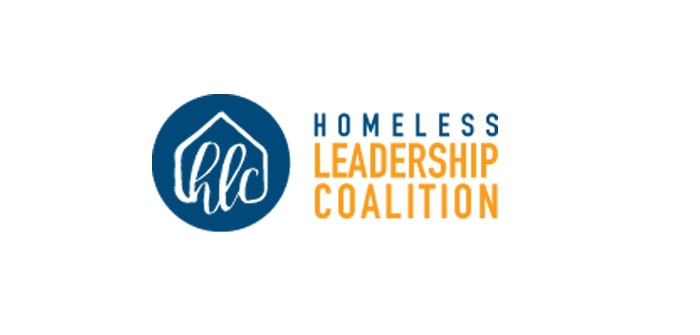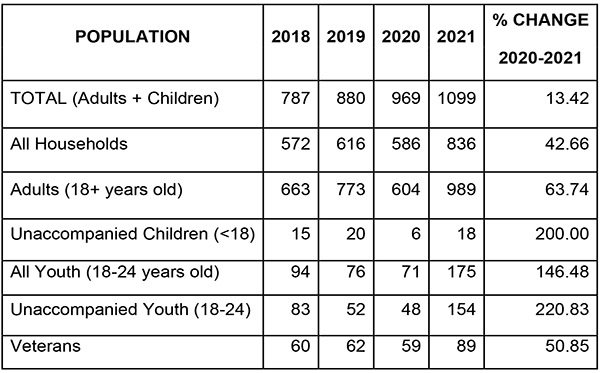This year, Central Oregon’s annual Point In-Time Count, a one night count of those experiencing homelessness in our region, determined that there are at least 1,099 people experiencing homelessness in the tri-county, an increase of 13 percent over last year.
The Point In-Time Count attempts to capture data on both sheltered and unsheltered individuals experiencing homelessness. In addition, information is gathered on a wide range of characteristics of those experiencing homelessness including age, gender, race, ethnicity, veteran status and disability status. With this information, the Homeless Leadership Coalition (HLC), local governments and agencies target services and develop plans to address poverty and homelessness in Central Oregon. This year, despite continued investments in our current shelter network, we see the limitations of our approach; 75 percent or 824 of the individuals counted were unsheltered on the night of January 20, 2021. While many believe otherwise, the primary reported cause of homelessness continues to be economic. In 2020, the HLC added a question to find out where people had last held housing and, at that time, 74 percent of those surveyed had lived in Central Oregon for more than a year.
“During the 2021 PIT count we counted a total of 193 youth who are experiencing homelessness in Central Oregon,” said Eliza Wilson, program manager for Grandma’s House of Central Oregon, a program of JBarJ Youth Services. “Eighteen of the counted youth were under the age of 18-years-old and homeless without a parent or guardian. We saw a 220 percent increase in this year’s count, but we believe the number of homeless youth to far exceed 193. Many homeless youth couch surf, stay in small groups and are oftentimes alone. Most of our young people do not frequent the larger encampments and attend school during the day which makes it difficult to encounter them when the count occurs. J Bar J Youth Services is committed to supporting homeless youth in Central Oregon and will continue to grow and adapt to their ever changing needs.”
These counts are the source of nationwide data on sheltered and unsheltered homelessness. This one night count is required of all jurisdictions receiving U.S. Department of Housing and Urban Development (HUD) funding to provide housing and services for individuals and families experiencing homelessness. This information ultimately helps the federal government to better understand the nature and extent of homelessness nationwide and direct federal funding accordingly. Homeless Leadership Coalition uses this data to make strategic decisions about projects to prioritize in the annual HUD funding competition.
“We have to put our local issue in the context of a national housing affordability crisis,” said Lindsey Stailing, vice-chair of Homeless Leadership Coalition. “In communities where cost of living soars, so too does homelessness. Recent investments are just the beginning of what is needed to strengthen our local homeless response system and fill the existing gaps. HLC is committed to a future where everyone in Central Oregon has a safe, stable place to call home.”
About the Point in Time Count:
Counts occurred in La Pine, Sunriver, Bend, Sisters, Redmond, Prineville, Madras and Warm Springs. The count was a service-based count, leveraging already existing partnerships and services to those experiencing homelessness in order to mitigate the spread of COVID-19. Surveys were conducted for the night of January 20, 2021; Due to COVID-19, surveys were collected between January 20-29 all asking about where the individual or household slept on the night of January 20. Individuals and families counted through this effort include people living in:
- Shelters
- Transitional housing
- “Doubled up” or precariously housed with families/friends
- Camping, sleeping outdoors or in cars or RV’s without full hookup
- Other places not meant for human habitation like a shed or storage unit
About the Central Oregon Homeless Leadership Coalition:
The Homeless Leadership Coalition is a collaboration of community partners in Crook, Jefferson and Deschutes counties, including the Confederated Tribes of Warm Springs engaging the community through education, advocacy, planning, prioritizing and accountability for services to persons experiencing homelessness. The HLC consists of more than 40 organizations and individuals from the tri-county region. They include shelter providers, public schools, public health, emergency services, veterans’ outreach, faith communities, public safety, mental health, housing services, public services, private employers, people with lived experience of homelessness and others. They represent a diverse group of interests, unified by a common focus.






